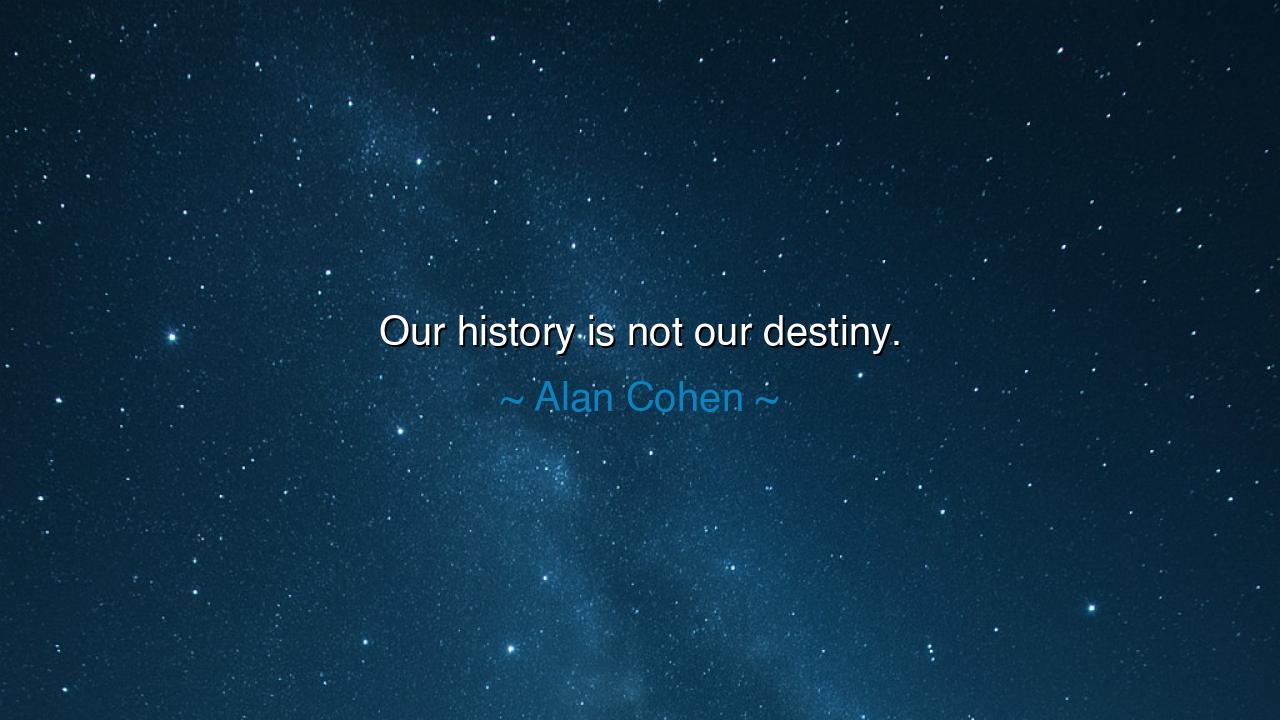
Our history is not our destiny.






“Our history is not our destiny.” — Alan Cohen
Listen well, O traveler upon the road of life, to the words of Alan Cohen, a teacher of the heart and a philosopher of the soul. In these few but mighty words, he delivers a revelation: that the past does not imprison the future. He reminds us that though we are shaped by what has come before — by our mistakes, our pain, our victories, our losses — we are not bound by it. History is the record of where we have been; destiny is the choice of where we are going. And the bridge between them is will, the sacred fire that burns within every human being.
The origin of this thought arises from the timeless struggle between memory and possibility. Cohen, a modern spiritual thinker, wrote these words as an antidote to despair — to awaken in humanity the truth that identity is not a prison built by circumstance, but a temple built by awareness. Too many souls, he saw, were chained by their own stories — saying “I am this because I was that.” They mistook history for fate, and forgot the eternal law of renewal: that the river of life is always flowing, and that we are not the stones that lie unmoving at its bottom, but the current itself, capable of change.
In truth, this wisdom is as ancient as time itself. The sages of old knew that every dawn is a resurrection, every choice a new birth. Consider the story of Nelson Mandela, who spent twenty-seven years in prison, his youth consumed by darkness, his body confined by walls of hatred. Yet when he emerged, he did not let bitterness define him. He said to his jailers, “As I walked out the door toward the gate that would lead to my freedom, I knew if I didn’t leave my bitterness and hatred behind, I’d still be in prison.” Thus, Mandela became living proof that history is not destiny. Though his past was filled with chains, his future was written in forgiveness — and that act of transcendence transformed not only himself but a nation.
Cohen’s words also speak to civilizations, not just individuals. History is filled with peoples who rose from ashes, who rebuilt what was broken and redefined what was possible. Japan, after the devastation of the Second World War, chose not to remain bound by defeat. Through perseverance and reinvention, it became a beacon of technology, culture, and discipline. So too have countless nations, once enslaved, found freedom; once conquered, found courage. The destiny of a people, like that of a soul, is not fixed by its wounds, but by its will to heal.
Yet Cohen’s insight also carries a challenge. To say that history is not destiny is to accept that we ourselves are responsible for change. It is easier, far easier, to blame the past — to say “I am broken because of what happened to me.” But the truth he offers is both liberating and demanding: you are not what happened to you; you are what you choose to become. To transcend history, one must first confront it — to see the patterns that bind us, the fears that repeat themselves, and the voices that whisper, “You cannot change.” And having seen them, one must rise.
Think, too, of Theodore Roosevelt, whose frail body and frequent sickness in youth seemed to doom him to weakness. But he refused the sentence of nature and history. “I will make my body,” he declared — and through sheer discipline, he did. His strength became his destiny, not his weakness. So must it be with us. Whether our “history” is the story of a childhood of pain, a lineage of failure, or a world steeped in violence, we are not condemned to repeat it. We are not the past — we are the possibility of transformation.
So take this teaching as a sacred law for your life: Your history is a teacher, not a tyrant. Do not bury it, nor worship it, but learn from it. Let every wound be a lesson, every sorrow a seed, every failure a foundation. Then turn your eyes to the horizon and act, for destiny is not a gift — it is a creation. Cohen’s words are a call to mastery, to live as those who are no longer enslaved by yesterday. For when a person — or a people — chooses to rise above their story, they do more than change themselves; they change the future. And thus the truth is fulfilled: our history is not our destiny, unless we choose to make it so.






AAdministratorAdministrator
Welcome, honored guests. Please leave a comment, we will respond soon